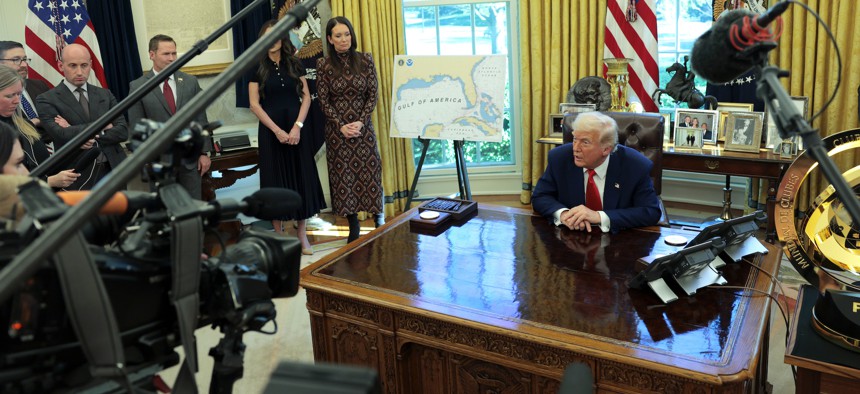
President Donald Trump speaks to reporters as he signs executive orders in the Oval Office on April 9, 2025. Several of the directives concerned regulatory policy. Anna Moneymaker / Getty Images
Trump directive aims to speed up deregulation by nixing public input
Advocacy groups have already announced they would challenge the president’s effort in court.
President Donald Trump on Wednesday issued a memorandum to expedite his deregulatory agenda in an action that has already prompted promises of legal challenges.
On Feb. 19, Trump signed an executive order requiring agencies, within 60 days and in coordination with the Office of Management and Budget and Elon Musk-backed Department of Government Efficiency, to identify for elimination or modification regulations that are unconstitutional or unlawful.
With roughly a week-and-a-half before that deadline, the president on Wednesday declared that such regulations can be repealed without going through the notice and comment period. When an agency promulgates a new rule, or revokes one, it must seek, respond to and potentially incorporate public comment on the proposal. The process usually takes at least a year.
The Trump administration, however, is arguing that it does not have to take this step because of the “good cause” exception in the Administrative Procedure Act, which is the law that sets rulemaking requirements. The exception provides that agencies do not have to perform notice and comment if doing so would be “impracticable, unnecessary or contrary to the public interest.”
“Retaining and enforcing facially unlawful regulations is clearly contrary to the public interest,” the memo said. “Furthermore, notice-and-comment proceedings are ‘unnecessary’ where repeal is required as a matter of law to ensure consistency with a ruling of the United States Supreme Court. Agencies thus have ample cause and the legal authority to immediately repeal unlawful regulations.”
Wednesday’s memo also directs agencies to evaluate the lawfulness of regulations with respect to recent Supreme Court rulings, including Loper Bright, a 2024 decision that ended the decades-old precedent of judges deferring to agencies when interpreting and implementing unclear federal statute, and a 2022 decision that restricted EPA’s ability to regulate greenhouse gases.
“If this action were upheld, it would be a significant change to the way regulation is typically done, which is through notice and comment,” said Roger Nober, director of George Washington University’s Regulatory Studies Center. “If the agencies determine that a rule is contrary to the Supreme Court's current jurisprudence, then [this order says they] have good cause to remove it and [they] can get around notice and comment. That's certainly an untested and untried way of implementing the Administrative Procedure Act.”
Nober warned that skipping notice-and-comment requirements could hurt the Trump administration if courts ultimately rule against it, which could take years to decide.
“If you're two or three years into the administration, and you then have to start with notice-and-comment rulemaking to be able to deregulate, what's going to be the long-term consequence of that?”
Public Citizen, a public interest nonprofit, seized on the eliminated notice-and-comment requirements in a statement denouncing Trump’s directive.
“President Trump is not a king. He cannot simply roll back regulations that protect the public without going through the legally required process,” said co-president Lisa Gilbert. “We will challenge this blatantly unlawful deregulatory effort at every step to ensure it doesn’t hurt workers, consumers and families.”
Democracy Forward, which has launched several lawsuits against the Trump administration, said it also would sue over Wednesday’s memorandum.
“The policies and programs that the nation has put in place, and that have served communities for decades, cannot be undone with the arbitrary stroke of a pen, despite what this president may wish,” said Skye Perryman, president and CEO of the national legal organization, in a statement.
On the other hand, the Competitive Enterprise Institute, a think tank committed to “reform[ing] America’s unaccountable regulatory state,” praised Trump’s deregulatory action.
“This new initiative goes beyond previous orders invoking typical platitudes about efficiency, cost-benefit and ‘outdated, unnecessary, or ineffective’ by specifically invoking ‘deconstruction’ of an administrative state now largely regarded as unconstitutional and irredeemable,” said CEI regulatory studies fellow Wayne Crews in a statement.
Trump on Wednesday issued several other regulatory directives that would require energy and environment agencies to put termination dates on certain rules, order a review of regulations to identify ones that deter competitiveness in the market and rescind the government definition of a “showerhead” in order to “maintain acceptable water pressure.”
How are these changes affecting you? Share your experience with us:
Sean Michael Newhouse: snewhouse@govexec.com, Signal: seanthenewsboy.45
NEXT STORY: GSA preps for layoffs at TTS







